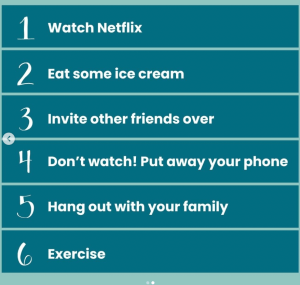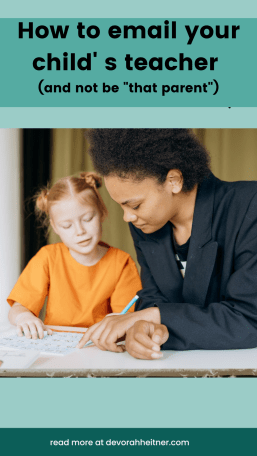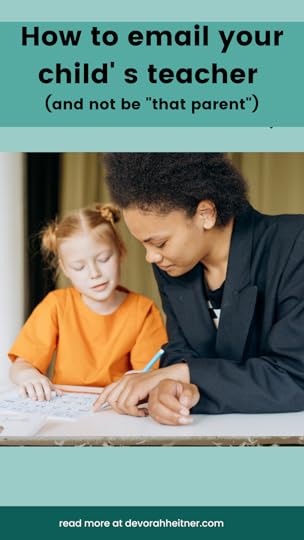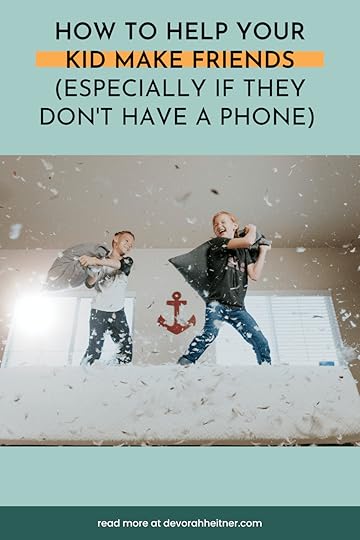Devorah Heitner's Blog, page 3
September 24, 2022
Why are my friends hanging out without me?
I recently worked with a great group of kids who shared their strategies for handling feeling left out.
I like to ask kids what they can do WHEN this happens. Not IF. Because it will happen to everyone, and I want to normalize that for kids who are new to social media. Seeing things that might make you feel bad or left out is the “price of the ticket” on social media…

Here are some ideas the kids shared:
1. Watch some Netflix
2. Eat some ice cream
3. Call some other friends to invite them over
4. Don’t watch! Put away phone.
5.Hang out with parents or siblings.
6. Excercise.
Don’t keep looking. Definitely do NOT text those folks right now to demand to know why they didn’t include you. Take care of yourself!
Back when we were kids and we were left out, we didn’t have social media to remind us. But your resilience and perspective helped you get through those experiences. You can share that wisdom and support with your child now.
When you have teenagers, hanging out with parents might well be a B-plan. In most relationships, that wouldn’t be healthy. I wouldn’t want to be my husband’s B-plan for Saturday night. But when you have a teenager, a movie night with parents could be a fallback. Be casual. Let them pick the movie.
Telling kids a story about a time you felt left out will help create more empathy and trust in your relationship. But I wouldn’t do it right at the moment when they are upset. Let it be about them. If at all possible, see if you can get them to unplug.
Watching peers post more is NOT going to help.
Overall, we want to help kids notice when something on their devices is making them feel bad and make decisions accordingly.
See this and share it as an Instagram post here.
You want to be running your devices, not letting them run you!
The post Why are my friends hanging out without me? appeared first on Devorah Heitner, PhD.
Exclusion in the Instagram Age: Why Are My Friends Hanging Out Without Me?
Exclusion is a terrible feeling – watching your friends have a great time on social media when you’re not a part of it.
I recently worked with a great group of kids who shared their strategies for what to do when they are feeling left out.
I like to ask kids what they can do WHEN this happens. Not IF. Because it will happen to everyone, and I want to normalize that for kids who are new to managing these issues on social media. Seeing things that might make you feel bad or left out is the “price of the ticket” on social media, unfortunately.
How to Deal with Feeling Left OutHere are some ideas the kids shared to fight the feeling of exclusion:

1. Watch some Netflix
2. Eat some ice cream
3. Call some other friends to invite them over
4. Don’t watch! Put away phone
5. Hang out with parents or siblings
6. Exercise
In short, don’t keep looking. Definitely do NOT text those folks right now to demand to know why they didn’t include you. Take care of yourself!
Back when we were kids and we were left out, we didn’t have social media to remind us. But your resilience and perspective helped you get through those experiences. You can share that wisdom and support with your child now.
When you have teenagers, hanging out with parents might well be a B-plan. In most relationships, that wouldn’t be healthy. I wouldn’t want to be my husband’s B-plan for Saturday night. But when you have a teenager, a movie night with parents could be a fallback. Be casual. Let them pick the movie.
Telling kids a story about a time you felt left out will help create more empathy and trust in your relationship. But I wouldn’t do it right at the moment when they are upset. Let it be about them. If at all possible, see if you can get them to unplug.
Watching peers post more is NOT going to help.
Overall, we want to help kids notice when something on their devices is making them feel bad and make decisions accordingly.
See this and share it as an Instagram post here.
You want to be running your devices, not letting them run you!
The post Exclusion in the Instagram Age: Why Are My Friends Hanging Out Without Me? appeared first on Devorah Heitner.
August 28, 2022
How to email your child’s teacher

It’s 8:15 on Sunday night and your kid sidles up to you and requests a “quick trip to Target to grab a few things for that project.”
What project? You ask.
Oh, you know. That big science project. The one they failed to tell you about. The one that’s apparently due tomorrow. The one that’s worth 30% of their grade.
And, wow, would you ever like to call their science teacher and ask them a million questions!
Most of us have lived through something like this. We want to help our kids, we want to talk to the teacher, we’re pretty sure calling the teacher’s personal number on a Sunday evening is not the way to go.
What to do?
But let’s focus on what we as parents can do to set a positive tone and foster a good parent-teacher relationship – especially as we head into a new school year!
Begin with empathyYour child’s teacher has a difficult job, especially after the last few years. Teaching is intense. There’s new educational technology, new standards, new testing—all of which take time for your child’s teacher to learn and integrate.
Teach kids thoughtful boundaries (and model them yourself)
If your child is old enough to email the teacher herself, then the child should also be aware and respectful of these boundaries and expectations. Just because you and your child can email the teacher, doesn’t always mean it is a good idea.
Before you (or your child) emails the teacher, check that the question can’t be resolved another way. If your tween didn’t write down the homework assignment, is it available from a classmate or the learning management system?
Kids should not make a habit of emailing the teacher instead of writing things down or knowing how to look things up.
Do reach out, politely
On the other hand, do encourage your child to email the teacher if he’s struggling, needs to meet with her, or has a question that only she can answer. By middle school, the communication is best from the student, when possible. You can still reach out about bigger struggles, but if your tween or teen needs to change their research topic or to set up a meeting with a teacher, they should initiate contact. If your child is new to email, you can offer to read those first student to teacher emails, checking for salutation, tone, etc.
don’t need to be super formal, but they do need salutations and at least one full sentence or question:
Hi Mr. Foremost,
Would it be OK to bring the class outside for our presentation on Tuesday?
We want to demonstrate centripetal force in an outdoor setting.
Thanks for considering, Gryphon S.
Hot tip: I hear some teachers don’t love the salutation, “hey.”
Let the teacher choose the mode of communication, if possible
Communication will be much more free-flowing if you make it as easy as possible for the teacher. Respect her communication preferences. If she prefers email to phone, then email it is! Of course, there are times when only face-to-face will do, but try not to pressure your child’s teacher about the way things “should” be done. If she wants your student to contact her through the learning management system (like Power school, etc.) then he needs to learn to do it. If that system isn’t working for you, there may be someone in the school or district who can walk you through and troubleshoot. I’ve been there, as a parent, and yes, it is a pain in the neck, but as much as possible, try to use what they want you to. That also may come from the top, as in your teacher may have been instructed by the principal that they need to keep all communication inside that system.
Model PatienceDon’t expect an immediate response. If you write to a teacher at night, they may talk to your child the next day.
We can also teach kids not to expect an immediate response from friends!
When I taught at the college level, I sometimes had students writing to me at 2am and 3am and then getting irate when I hadn’t responded at 4am. Teachers are people. They often can’t look at email during the school day, and late at night is also not a fair expectation. Expect _at least_ a 24-48 hour turnaround time and more on the weekend.
Don’t Over Check School AppsToo much information is not always great for your relationship with your child or their teachers. Lots of schools now let you check your child’s grades on quizzes and tests as they are posted. Unless you are managing a particular struggle, constant updates may cause more stress than they are worth! I interviewed teachers and families about this issue for my forthcoming book, Growing Up in Public, and many teachers told me that students and parents will email with concerns before they have had a chance to update grade books online. Students shared that they feel mistrusted and frustrated when their parents text during the school day about grades. Try not to check. If you or student is the over-checker, encourage them to take the app off their phone.
Even with a student who is struggling, checking once a week may make more sense than once a day.
Always assuming good intention whenever possible will go a long way towards positive communication. Giving others (teachers, colleagues and friends) the benefit of the doubt when communication gets tough goes a long way towards positive relationships. We’ve all been through a stressful few years. Let’s model patience for our kids. It is a gift that will keep on giving !
The post How to email your child’s teacher appeared first on Devorah Heitner, PhD.
How to email your child’s teacher

It’s 8:15 on Sunday night and your kid sidles up to you and requests a “quick trip to Target to grab a few things for that project.”
What project? You ask.
Oh, you know. That big science project. The one they failed to tell you about. The one that’s apparently due tomorrow. The one that’s worth 30% of their grade.
And, wow, would you ever like to call their science teacher and ask them a million questions!
Most of us have lived through something like this. We want to help our kids, we want to talk to the teacher, we’re pretty sure calling the teacher’s personal number on a Sunday evening is not the way to go.
What to do?
But let’s focus on what we as parents can do to set a positive tone and foster a good parent-teacher relationship – especially as we head into a new school year!
Begin with empathyYour child’s teacher has a difficult job, especially after the last few years. Teaching is intense. There’s new educational technology, new standards, new testing—all of which take time for your child’s teacher to learn and integrate.
Teach kids thoughtful boundaries (and model them yourself)If your child is old enough to email the teacher herself, then the child should also be aware and respectful of these boundaries and expectations. Just because you and your child can email the teacher, doesn’t always mean it is a good idea.
Before you (or your child) emails the teacher, check that the question can’t be resolved another way. If your tween didn’t write down the homework assignment, is it available from a classmate or the learning management system?
Kids should not make a habit of emailing the teacher instead of writing things down or knowing how to look things up.
Do reach out, politelyOn the other hand, do encourage your child to email the teacher if he’s struggling, needs to meet with her, or has a question that only she can answer. By middle school, the communication is best from the student, when possible. You can still reach out about bigger struggles, but if your tween or teen needs to change their research topic or to set up a meeting with a teacher, they should initiate contact. If your child is new to email, you can offer to read those first student to teacher emails, checking for salutation, tone, etc.
don’t need to be super formal, but they do need salutations and at least one full sentence or question:
Hi Mr. Foremost,
Would it be OK to bring the class outside for our presentation on Tuesday?
We want to demonstrate centripetal force in an outdoor setting.
Thanks for considering, Gryphon S.
Hot tip: I hear some teachers don’t love the salutation, “hey.”
Let the teacher choose the mode of communication, if possibleCommunication will be much more free-flowing if you make it as easy as possible for the teacher. Respect her communication preferences. If she prefers email to phone, then email it is! Of course, there are times when only face-to-face will do, but try not to pressure your child’s teacher about the way things “should” be done. If she wants your student to contact her through the learning management system (like Power school, etc.) then he needs to learn to do it. If that system isn’t working for you, there may be someone in the school or district who can walk you through and troubleshoot. I’ve been there, as a parent, and yes, it is a pain in the neck, but as much as possible, try to use what they want you to. That also may come from the top, as in your teacher may have been instructed by the principal that they need to keep all communication inside that system.
Model PatienceDon’t expect an immediate response. If you write to a teacher at night, they may talk to your child the next day.
We can also teach kids not to expect an immediate response from friends!
When I taught at the college level, I sometimes had students writing to me at 2am and 3am and then getting irate when I hadn’t responded at 4am. Teachers are people. They often can’t look at email during the school day, and late at night is also not a fair expectation. Expect _at least_ a 24-48 hour turnaround time and more on the weekend.
Don’t Over Check School AppsToo much information is not always great for your relationship with your child or their teachers. Lots of schools now let you check your child’s grades on quizzes and tests as they are posted. Unless you are managing a particular struggle, constant updates may cause more stress than they are worth! I interviewed teachers and families about this issue for my forthcoming book, Growing Up in Public, and many teachers told me that students and parents will email with concerns before they have had a chance to update grade books online. Students shared that they feel mistrusted and frustrated when their parents text during the school day about grades. Try not to check. If you or student is the over-checker, encourage them to take the app off their phone.
Even with a student who is struggling, checking once a week may make more sense than once a day.
Always assuming good intention whenever possible will go a long way towards positive communication. Giving others (teachers, colleagues and friends) the benefit of the doubt when communication gets tough goes a long way towards positive relationships. We’ve all been through a stressful few years. Let’s model patience for our kids. It is a gift that will keep on giving !
The post How to email your child’s teacher appeared first on Devorah Heitner.
August 24, 2022
Why should you plan before getting your kid a phone?
It is worth planning before getting your child a phone. It might be OK to surprise THEM, but it shouldn’t be spontaneous. It might be better to plan this with them, and let something else be a surprise. That way you can set expectations in advance.
A phone is a BIG deal. You’re giving them the whole world in their pocket. You’re giving everyone access to your kid who has their contact info, you’re giving your kid access to the internet, which we know has some things on it that you don’t necessarily want little little kids to have access to. And even for big kids, we want to have those conversations about content.
I was on Wake Up with Cheddar TV News talking with hosts Alicia Quarles and Shannon LaNier about the challenges of helping kids prepare for this big transition.
And it can be very distracting to carry around a phone, especially at school, so it’s worth really planning this decision out.
What other factors can help parents decide if kids are ready for a phone?You’re looking for independence milestones in your child or tween.
Can they walk to school independently?Can they get some chores done independently?Can they do their homework independently without a ton of oversight,Would you leave them to watch another kid for a few minutes? An hour?If they can’t do anything yet for themselves, then they probably may not be ready for their own phone. Maybe you want them communication device that they can have some occasional access to for now. You don’t need to go from having nothing to having a smartphone that they have 24/7 access
Also, how do they act in their friendships
A phone can be a way of a permanent record of those challenges… So it’s not ideal to give a kid a phone if they’re still working out some some really crucial social skills. Even once they get a phone, it’s worth working with them on repair for the mistakes we all make at some point.
Parents can look for those independent, mild independence milestones, and start to work on practicing for the skills you want to see your child mastering, before you get them a phone.
On the other hand, here are some signs your child might not be ready just yet.
Good luck! This is an important decision.
The post Why should you plan before getting your kid a phone? appeared first on Devorah Heitner, PhD.
August 15, 2022
How To Help Your Kid Make Friends (Especially If They Don’t Have A Phone)

We moved last summer and we’re still getting to know our new town and neighborhood – Thanks pandemic! My kid was in fifth grade when the world shut down and reentered in-person school in seventh grade.
A few crucial social milestones have passed since elementary school. Kids are making their own plans (with some scaffolding and checking in – “Am I free on Saturday?” type questions and “Can you drive me somewhere” kinds of requests).
But kids are in a new place in terms of connecting with one another. And we can’t always facilitate. My kid’s new middle school doesn’t have a directory so my son is on his own if he wants to see someone outside of school – I can’t “help” by reaching out to parents.
And this is much to his relief, at this point. But there have been times where I miss my ability to reach out to other parents or even to know their names.
In your community, or at your kids’ school, that level of social independence may happen much sooner. Some kids are connecting independently and getting each other’s phone numbers, school email, or Roblox handle in 4th or 5th grade and communicating independently.
How can you help kids make friends – especially if your kid doesn’t have a phone?I like to teach kids the idea of FP – someone who has “friend potential.” Here are some ways connect with kids who have that “friend potential!”
Ask them to meet up in Roblox, Minecraft, Fortnight or another online game
This can be a low stakes way to hang out outside of school with someone they like to talk to at lunch or recess. And hanging out won’t be limited to when a parent can drive them somewhere to meet up.
Meet up in-person at a low-pressure community space
If they’re not quite ready to hang out at this potential-new-friend’s house, is there a fun public space where they can meet up? The beach, the library, the skate park, an arcade, the school playground, or the library are all great options.
This takes the pressure off you to entertain and supervise someone else’s child and gives the kids something to do if they’re not quite at the stage of friendship where they’re having deep and meaningful conversations. They can compliment each other’s kick flips or diving techniques till they work up to deeper topics.
Join a club, a rec league, or an activity
Encourage your child to try something new. Clubs are about exploring interests but they are GREAT places to make friends and often allow more social time than the structured school day does. If your kid isn’t a super serious athlete but enjoys playing a sport, see if your neighborhood offers recreational leagues where your kid can make friends without the pressure of winning the state championship.
Clubs, leagues, and activities are also great because they sort of put socializing and friend-making on autopilot and remove the pressure to be planning play dates or remembering to nudge your kid to text a friend. Instead, you know that on Tuesdays your kid will always be meeting up with peers to play pickleball and on Friday they’ll always be practicing for the one-act play.
Things to keep in mind while making new friendsAs your kid navigates making new friends in the digital age, it’s a great time to develop good tech habits before they get their first phone.
Teach kids what contact info they can share
If they don’t have a phone in elementary school, is it okay for the other kid’s parents to text you? Or can they use school email to make a plan? What the best way for a potential friend to contact them and vice versa?
Teach them to mindfully add contacts
Should you know every single person your child is befriending? Should you know their parents? At what age is their social universe largely their own?
Ask for help or insight if need be
It can be nerve-wracking to make an open bid to see a classmate outside of school. If kids are struggling with that, and you have a good school social worker, counselor or a supportive teacher, see if there is anything they can do to support the process.
A great book for all kids who need some good ideas for what to say is Catherine Newman’s What Can I Say. Filled with empathy and lovely illustrations, the book feels uplifting and not at all admonishing! She has advice for tricky situations including distancing yourself from a friend, showing empathy when others are struggling, and even kindly but firmly ending a dating relationship.
How do you help your kid connect with their peers – especially if they don’t have a phone? Please share your tips in the comments!
The post How To Help Your Kid Make Friends (Especially If They Don’t Have A Phone) appeared first on Devorah Heitner, PhD.
July 1, 2022
Worried that Screens Will Eat Your Summer Vacation?

When we see our kids using screens more than we’d like, it’s easy to jump to conclusions or assume the worst. But these days, kids can use devices for almost everything, so what might look like mindless scrolling or binge-watching could actually be a Youtube video about pollinators, a group chat with their cousins planning to meet up, or designing a roller coaster track using basic physics.
As we put together our plans for vacation screentime, let’s remember the different types of screen use:
Connecting with friends and family
Our kids want and need to stay in touch with friends when school is out for the summer. Tech-based communication like Zoom, Google Meet, Facetime, and Whatsapp makes staying in touch with far flung family members easier, too.
Passive use vs. Interactive use
Is your kid interacting and engaging with apps and tools they use – building worlds, playing games, designing characters? Or is it passive – simply scrolling, “liking,” or watching?
Creating vs. Consuming
Is this screen time that encourages creation – editing videos, recording songs, writing a play, drawing a comic? Or are they just consuming other people’s content?
Learning new things
Sometimes passive consumption is educational – TikTok has become a surprisingly educational platform! If your kid is currently fascinated by a specific topic, screen time can be a great educational opportunity. Do check in with them about what they are learning and have them show you the videos and channels they are watching.
Reduce screen use conflict by scheduling “Pro-tech Days”Our kids are less likely to argue about screen use if they know what to expect.
If they know they’ve got a week of less-restricted screen use coming at the end of the month, they probably won’t spend quite as much time begging to turn on the video game console at the beginning of the month.
So take out the calendar and look at the rest of the summer. Are there any sections of time that really lend themselves to unrestricted or less restricted screen use?
If you’re working from home this summer, is there a week when you’ll need uninterrupted time for a big project? Giving your child more screen time that week will make things much easier for you. Or maybe your family has a show that you love that you’ll miss when you travel and you can plan to watch all your missed episodes the weekend after you get back. Promising not to watch a shared show while your child is in overnight camp will also earn you some goodwill.
Or after a few weeks of outdoor-only, screen-free day camp, your kid may enjoy some less-restricted access to a day of Roblox.
Once you’ve identified some days that make sense, schedule these “Pro-tech Days” and make sure your kid knows when they are. Keeping your kids involved and informed will dramatically cut down on the conflict.
Schedule in “Unplugged Days” tooWhen you’re consulting your calendar for those “Pro-tech Days,” schedule in some Unplugged Days, too. We can all make these screen-free days more appealing to our kids by planning some truly enjoyable unplugged activities and involving them in that planning process.
Maybe don’t expect your teenage son to spend one of his Unplugged Days staring at impressionist landscape paintings at the museum with you. Unless you know that’s his jam. If you are in Chicago, maybe this cool Nick Cave show at the MCA. would be fun. Or some live music in the park. Or a trip to a beach with the super soakers and some friends.
Alongside your kid, brainstorm ways to spend these Unplugged Days that won’t feel deprivational or boring. 1000 Hours Outside is one of my favorite resources for screen-free ideas.
Download apps that encourage more creative screen timeCounterintuitive as it sounds, we can encourage more creative screen use by downloading more apps. If your kid is mostly using screens for passive consumption, think about their hobbies and interests and try to help them find interactive, creative apps that support those interests.
Apps, games, and software for kids who are interested in music
* TuneTrain
* GarageBand
* Virtual Drumming
Apps, games, and software for kids who are interested in science
* Nasa App
* Sky View App
* Weather App
Apps, games, and software for kids who are interested in art and design
* Drawing Pad
* Fashion Design Sketches
* Skyscraper App
You can also work on taking things in the the other direction–moving from on screen to off. If your tween or teen is watching cooking shows, they can make brunch and snacks! Or dinner every Thursday.
If your kid is watching home organizing TikTok videos (why, oh why won’t my kid watch those?) Encourage them to organize the bathroom. Or pick a project they are excited about. They can always make a stop motion animation or take before and after pictures if that makes it more fun!
“What are the fun summer things we need to make sure we do this year?”Include kids in the planning process:
In general: plan and be intentional – it’ll take a bit of effort, but it’ll make summer more fun for EVERYONE.
Is there a place you’ve heard about that you want to visit?
Are there friends you want to go camping with?
Do you want to learn a new skill?
Do you want to try a first sleepover with friends or grandparents without the pressures of the school year?
Can teens with a learner’s permit or a new license help with driving on a family road trip?
Find ways to access “novelty” outside of your phoneFinally, we can look for way to find novely offline. For the last 2.5 years, most of us have found novelty almost exclusively through our screens – new Netflix shows, new phone games, new TikTok accounts to follow. And for many of us, the sense of novelty has kept us going through this long, monotonous pandemic.
But as things open back up and we start to rebalance our lives and venture into the world, we can find novelty in a new playground, a new ice-cream flavor, or a new skill. I just took a rowing class. In a real boat. Rowing is hard. It turns out, there is a LOT of upper body strength involved…starting with carrying the boat down to the river. But it was new and exciting, and even though I am still sore…I also feel rejuvenated by having tried something new. If you try something new this summer, I’d love to hear how it goes.
Photo credit: pexels-jessica-lewis-creative-4200824
Hit the reset button on your family’s digital life!Sign up below for 7 days of actionable strategies, right in your inbox.
The post Worried that Screens Will Eat Your Summer Vacation? appeared first on Raising Digital Natives.
January 5, 2022
Feels Like Groundhog Day. Again.

I don’t know about you, but I am having a Groundhog Day kind of feeling. Our family watched the movie again over winter break. A winter break where we canceled almost as many plans as we made.
We had hoped to go to Spain but then decided we didn’t want to risk travel bans, so we planned an exciting trip to…New York City. COVID numbers were low and we haven’t been there in way too long.
As the date grew closer, even our family and friends in New York who really wanted to see us suggested that it might be better to wait. In the end, we went to nearby Morton Arboretum and walked among the winter trees and epic sculptures, appreciating the squirrels. We went to the library and stocked up on graphic novels and DVDs. We hiked in the forest preserve. We played Catan and Risk. And we watched a LOT of movies. Including some classics. Like His Girl Friday, which we all enjoyed. And of course, Groundhog Day.
Do you remember the movie? Sometimes, I feel like I am stepping off the curb into icy slush, again and again. If your family hasn’t seen Groundhog Day, add it to your “Omicron/Staying Home Again” movie queue…
Seriously, whether you are staying home AGAIN, or you never stopped, this is starting to feel like a big chunk of our lives and our kids’ lives. If you are having a lot of feelings about that, I’m right here with you.
We’ve been to one in-person Bar Mitzvah during this pandemic and I almost cried watching the (masked, of course) kids doing the limbo and dancing to the live Klezmer band. It felt so right and so sweet. Shortly after that, all the upcoming planned B-Mitzvah celebrations moved back to zoom. The kids are resilient. A zoom B-Mitzvah can be a beautiful thing. But I still feel sad and disappointed for these families that planned so much, for the young people who have worked so hard, and for all of these kids sitting through week after week of two-hour zooms instead of joyful, in-person celebrations. This is really, really hard.
So, I’m sharing a couple of resources that I hope can help a little, as well as my solidarity. You are not alone.
Support for Getting Through This TimeMy friend Phyllis Fagell has some great tips for 5 ways adults can boost kids’ well-being — and their own— as schools return from break in a Covid surge this week. I love that she reminds us that self-care is NOT selfish, it actually helps us to be better parents and educators.
She also reminds us “Don’t be afraid to cope out loud. Let your child hear you stay hopeful even if the first thing you try is ineffective.”
Feeling like you can’t stop scrolling the news right now? Having a hard time watching other people’s vacations after canceling your own (that was me.) I spoke with the Wall Street Journal about how to unhook from your phone, especially if you are doomscrolling or if social media is taking you away from things you really want to do. Like engaging with your family. Or reading a good book.
Can’t get to WSJ because of the paywall? I’ve summarized my advice on Instagram. My favorite tip is silencing ALL the bings and tings. I really don’t need a jarring ping to let me know the moment a text comes in.
And if you are back in remote school like we are, here are my remote school survival tips in case you took them off your fridge.
Favorite tip: Post a handy cheat sheet of all the logins and passwords by the student’s work station and in the photos on parents’ phones.
What else is helping us get through this time? Nature. I am teaching myself to cross country ski. Since I learned from Youtube, I’m not that good. Yet. But it is OK. When I was interviewing kids and teens for Screenwise, kids told me that they learn a lot of new skills from Youtube. Giving it a try as a middle-aged learner has been an adventure.
Art is also getting me through. Our very own art. Even though we moved this summer, we hadn’t gotten around to hanging our art yet. We have a LOT of art and it was all sitting in boxes. Hanging the art made space for a remote school “office” for our 7th grader, AND it brought our old friends back into our lives. We spent the last two weeks framing and arranging old and new artwork and it feels so good to see our favorite pieces on the walls again. This street art bird (below the PS) went up in my office and is keeping an eye on me as I write my new book on Growing Up in Public.
Finally, our gratitude is helping. It can be hard to tune into that channel right now. But today I drove my kid to school in 10 degree weather. Volunteers and staff were waiting outside to administer drive-through COVID tests to see if our district can return to in-person learning. These folks are outside in the frigid wind from 7am to 3pm today, trying to make it safer for the kids to go back to school. We could not thank them enough.
I hope you and your family are staying safe, even with the curveball of this latest wave of the pandemic.
Want Insights from Raising Digital Natives in your Inbox? Sign up below!The post Feels Like Groundhog Day. Again. appeared first on Raising Digital Natives.
November 16, 2021
Kids are Growing Up in Public and Parents are Worried

Unless you were a child celebrity, your kid probably has far less privacy than you did. From first time your child plays a game on a public server, to their first email account, first phone, first social media account, to taking over managing their own medical and academic records at 18, growing up is now full of digital milestones that parents are often surprised by and ill-equipped to mentor their children through. I call this the digital coming of age. The recent documentary, The Social Dilemma, stoked parents’ worries about this digital coming of age.
Parents ask me questions about privacy settings, monitoring apps, and tracking their kids. Parents want the lowdown on the impact of their teenager’s digital profile on their college admissions prospects. They worry their kid’s friends will take a picture or video of them doing something stupid and share it widely, shaming their child and foreclosing future opportunities. I am writing a new book, GROWING UP IN PUBLIC, to help parents navigate this terrain. I am deep into my research and writing and would love to hear about your experiences.
Want to Help?If you have kids between 5 and 24 and want to share stories that might be used (anonymously and with identifying details changed) please take my survey or reach out directly.
Growing up in Public Parent Survey
Here are a few articles I’ve written about growing up in public:
It’s not just about admissions: Teaching Kids to Live Well Even When No One is Watching Washington Post
Rules for Social Media Created by Kids New York Times
Your Kid Wants to Start a YouTube Channel: Some Advice
Washington Post
The post Kids are Growing Up in Public and Parents are Worried appeared first on Raising Digital Natives.
Kids are Growing Up in Public and Parents are Worried

Unless you were a child celebrity, your kid probably has far less privacy than you did. From first time your child plays a game on a public server, to their first email account, first phone, first social media account, to taking over managing their own medical and academic records at 18, growing up is now full of digital milestones that parents are often surprised by and ill-equipped to mentor their children through. I call this the digital coming of age. The recent documentary, The Social Dilemma, stoked parents’ worries about this digital coming of age.
Parents ask me questions about privacy settings, monitoring apps, and tracking their kids. Parents want the lowdown on the impact of their teenager’s digital profile on their college admissions prospects. They worry their kid’s friends will take a picture or video of them doing something stupid and share it widely, shaming their child and foreclosing future opportunities. I am writing a new book, GROWING UP IN PUBLIC, to help parents navigate this terrain. I am deep into my research and writing and would love to hear about your experiences.
Want to Help?If you have kids between 5 and 24 and want to share stories that might be used (anonymously and with identifying details changed) please take my survey or reach out directly.
Growing up in Public Parent Survey
Here are a few articles I’ve written about growing up in public:
It’s not just about admissions: Teaching Kids to Live Well Even When No One is Watching Washington Post
Rules for Social Media Created by Kids New York Times
Your Kid Wants to Start a YouTube Channel: Some Advice
Washington Post
The post Kids are Growing Up in Public and Parents are Worried appeared first on Devorah Heitner.



